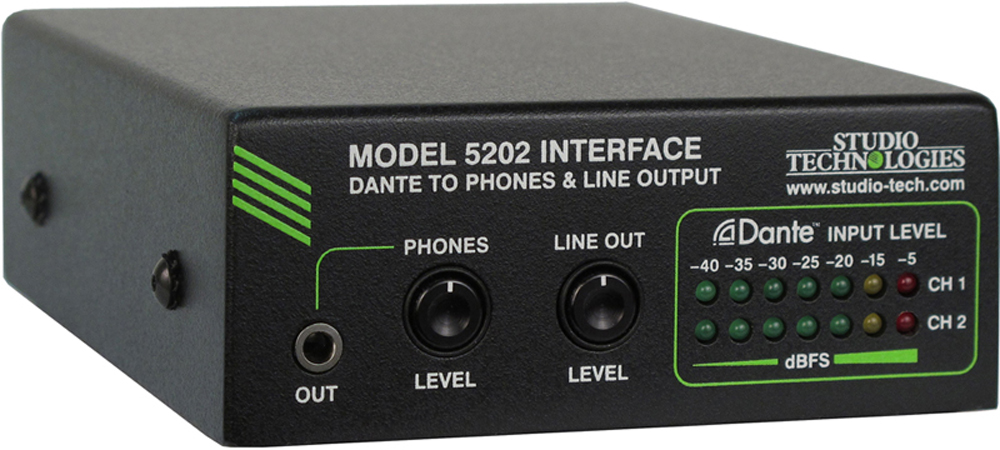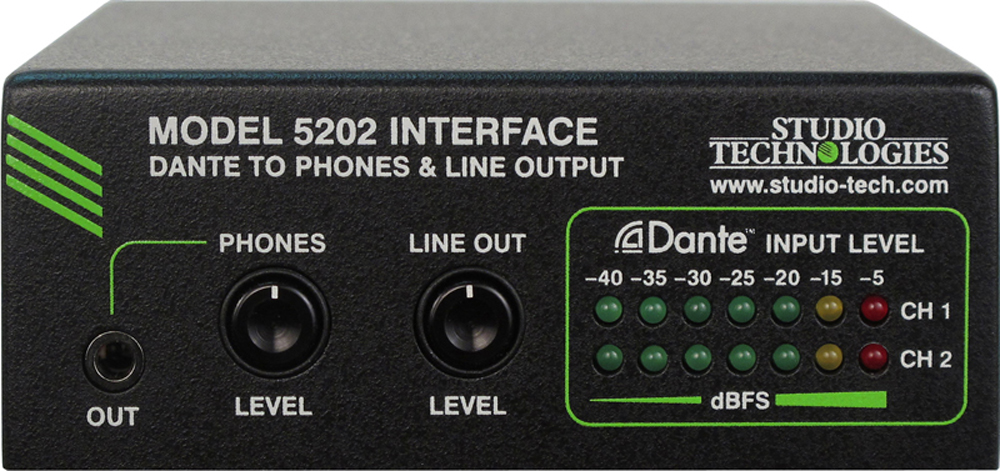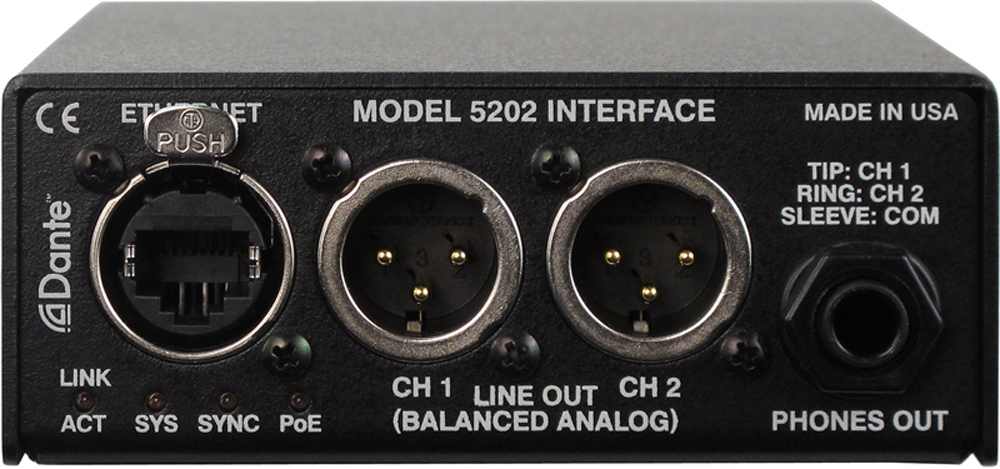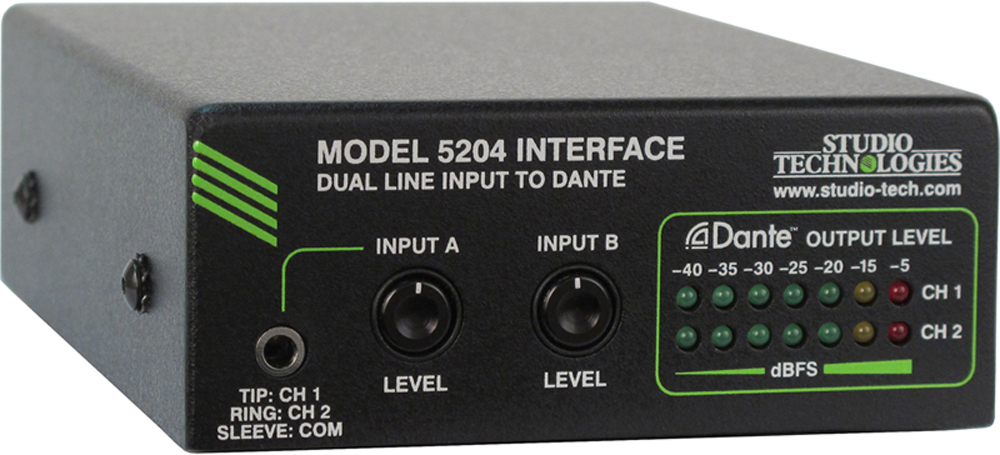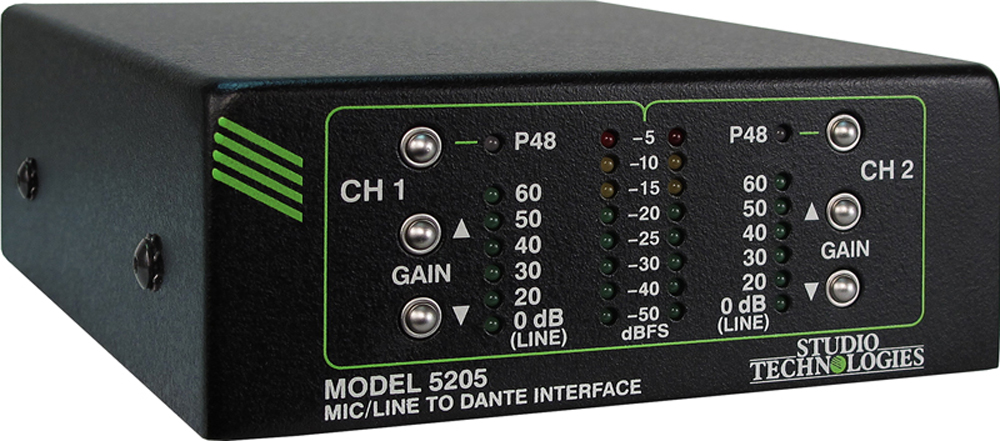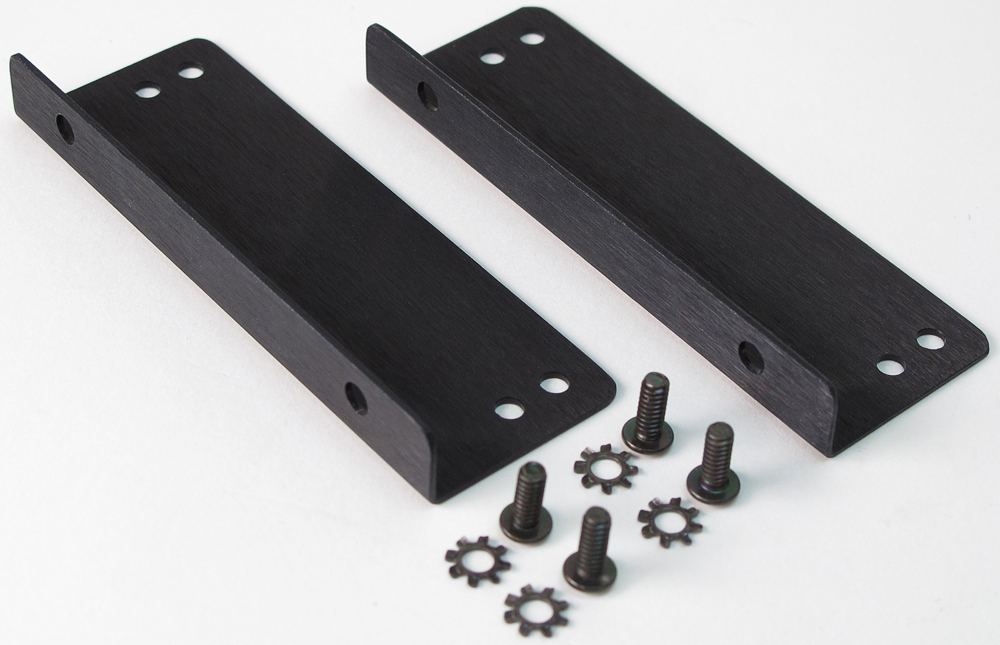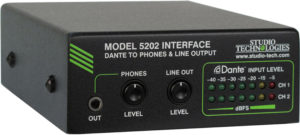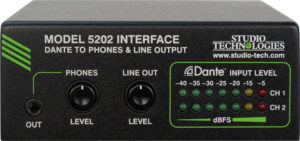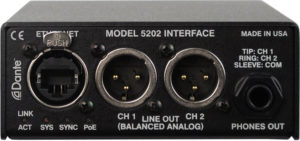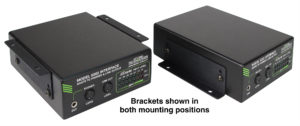The Model 5202 Interface is a general-purpose audio device that supports applications utilizing the Dante® audio-over-Ethernet media networking technology. Two Dante-associated audio channels can be assigned to the Model 5202 which provides headphone and balanced line-level outputs. The audio quality is such that virtually any audio application can be supported, from simple headphone or loudspeaker monitoring to interfacing with high-performance on-air broadcast, stadium AV, or corporate audio systems. Multi-step LED meters provide confirmation of the level of the two input audio channels. The compact, lightweight design allows the Model 5202 to be used in portable or desktop situations or deployed as a permanent solution in fixed applications. Standard connectors ensure fast, reliable deployment. The unit requires only an Ethernet connection to supply both the data interface as well as Power-over-Ethernet (PoE) power.
Applications
The Model 5202 is perfect for use in conjunction with the Dante Controller software application. Driving a pair of headphones or set of amplified speakers, audio flows and associated channels can be quickly confirmed for content as well as signal level. For field applications the unit can serve as both a test tool and a general-purpose source of analog audio outputs. With level controls associated with both the headphone and line outputs interfacing with virtually any analog audio input is a simple matter. For permanent applications there's no reason why a Model 5202 can't reside within an equipment rack or be mounted, using optional brackets, underneath a table or on-air studio set. The low-power circuitry is intended for continuous operation.
Headphone Output
A sonically-excellent 2-channel (stereo) headphone output is provided. It is capable of driving contemporary headphones, headsets, and earbuds to substantial levels at very low distortion. A rotary control is used to adjust the headphone output level. The level knob is a push-in/push-out type which helps prevent inadvertent adjustment. For flexibility the headphone output is provided on two separate 3-conductor jacks: a 3.5 mm on the front panel and a ¼-inch on the back. The audio quality of the headphone output is such that it can also be used as a 2-channel unbalanced line output. The output level control will make it a simple task to optimally interface the headphone output with inputs on personal computers, portable audio devices, and "semi-pro" equipment.
Line Outputs
The Model 5202 provides a 2-channel line-level, electronically-balanced analog audio output by way of standard 3-pin male XLR connectors located on the back panel. A rotary level control allows the nominal (average) level of the line outputs to be adjusted. Using the push-in/push-out knob it's a simple matter to achieve the desired nominal output levels which include –10, 0, or +4 dBu. And with a maximum output level of +24 dBu there will always be sufficient headroom for "pro" audio performance. Protection components in the output circuitry help ensure reliability in field applications.
The line outputs can serve a number of monitoring and interfacing uses. Audio amplifiers or amplified speakers can be directly connected. The level control can be used to adjust the speaker volume or used as a level trim function to match the speaker's input sensitivity. The line outputs can also serve as a source for interfacing with analog inputs on audio consoles, wireless in-ear or IFB monitor systems, as well as audio recording devices. The level control will help to ensure that the nominal level of the line outputs will match the requirements of the connected equipment.
Metering
Two 7-step LED meters provide a real-time level indication of the two Dante-supplied audio channels. Scaled in dBFS (decibels referenced to full scale digital) the meters offer a direct view of the signal levels as they arrive in the digital domain. Optimal audio performance requires transporting signals at their proper levels — without an accurate indication this can be difficult to achieve.
Ethernet Data and PoE
The Model 5202 connects to a data network using a standard 100 Mb/s twisted-pair Ethernet interface. The physical interconnection is made by way of a Neutrik® etherCON RJ45 connector. While compatible with standard RJ45 plugs, etherCON allows a ruggedized and locking interconnection for harsh or high-reliability environments. An LED displays the status of the network connection.
The Model 5202's operating power is provided by way of the Ethernet interface using the Power-over-Ethernet (PoE) standard. This allows fast and efficient interconnection with the associated data network. To support PoE power management the Model 5202's PoE interface reports to the power sourcing equipment (PSE) that it's a class 1 (very low power) device. An LED is provided to indicate when power is being supplied to the Model 5202. Note that no provision has been made to allow an external power source to be connected. However, if the associated Ethernet switch does not provide PoE capability a commonly-available mid-span PoE power injector can be utilized.
Dante Audio-over-Ethernet
Audio data is sent to the Model 5202 using the Dante audio-over-Ethernet media networking technology. As a Dante-compliant device, two audio channels can be assigned to the unit using the Dante Controller software application. A single mouse-click is all that's required to route an audio signal to the Model 5202. Bit depths of up to 24 and sample rates of 44.1, 48, 88.2, and 96 kHz are supported. Two bi-color LEDs provide an indication of the Dante connection status.
The Model 5202 is compliant with the AES67 interoperability standard. In addition, the unit is compatible with the Dante Domain Manager™ (DDM) software application.
The Model 5202 uses Audinate's Ultimo™ integrated circuit for implementing Dante. The integrated circuit's firmware can be updated via the Ethernet connection, helping to ensure that its capabilities remain up to date.

